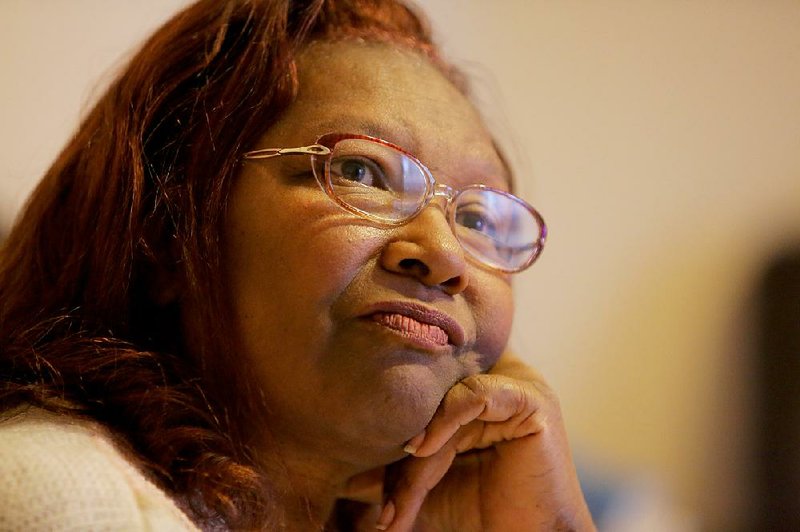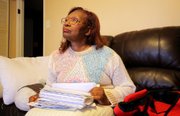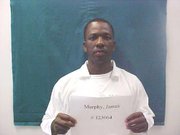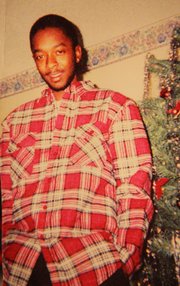Perched on the edge of a brown leather couch, 65-year-old Dorothy Holloway gazes through the floor-to-ceiling double window in front of her to the woods beyond her home.
Her thoughts flutter across her face -- her lips purse tightly one moment, then the corners slowly rise the next.
Holloway looks at her hands in her lap, turns her palms upward and then down again. Her eyes glisten. She gently traces the back of her right hand with a fingertip, concentrating on the length, the curve and the lines around her knuckles.
"Her hands," she says, almost in a whisper, thinking of her granddaughter Jada, now 16. "Her hands are like his. She's got my baby's hands."
Jada was born just 10 months before Holloway's son, Brian Hornes, was killed by a bullet that pierced the left taillight of his 1986 Chevy Caprice, traveled through the trunk and two seats, then entered his back and ricocheted to nick his heart.
After more than 16 years, now Holloway can sit in a prison visitation room and hold the hands of his killer.
James Murphy, who was 16 at the time of Hornes' death, is serving a 40-year prison sentence. He is now in the Varner Unit in Gould.
When Holloway first visited him, he was in the Brickeys Unit. He fidgeted, clasped and unclasped his hands as he sat across a table from her, but he met her eyes.
She saw remorse, fear and compassion.
"He had kind eyes," she says.
"He told me to ask him any question I wanted. He said, 'I'll tell you anything you want to know,'" Holloway says, smiling serenely. "In that moment, I was honored. He wanted to help me find peace, to know what happened to my son."
Holloway says she laid her hand out flat on the table between him and her, palm up.
"He put his hand in mine," she says, a tear rolling down her cheek. "We held hands. We cried. And we cried."
The Crime
In December, dressed in a white jumpsuit with 123064 stamped over his heart, Murphy sits down at a stainless-steel table and nods a greeting through the Plexiglas in front of him.
The Varner Unit is a high-security prison about 28 miles south of Pine Bluff. It holds about 1,600 prisoners, including 34 currently on death row.
At 32, Murphy has spent half of his life behind bars. There are 24 years left on his sentence. He will be eligible for parole in 2027.
His fingers are long. His nails are clean and trim. He forms a tepee with his hands on the table in front of him, then attempts a smile that quickly vanishes.
"I take full responsibility," he says of the shooting.
In the pre-dawn hours of Oct. 4, 1999, Murphy recalls, he was in a car with his uncle Maurice Kelly and Kelly's date, Keisha Webb. Webb was Hornes' ex-girlfriend and Jada's mother. Murphy and Kelly were driving Webb to her home, when 23-year-old Hornes started following their car. Webb was frightened, so rather than drop her off at her house, they circled back to Kelly's home.
Murphy asked to be let out of the car, and he waved Hornes over to talk as Kelly and Webb drove off.
"He was upset with Keisha. After he explained his reason for being upset, he pulled off kinda fast in pursuit of Keisha and Maurice," Murphy recalls.
Murphy saw Hornes hold a gun outside his car window and aim it at Kelly's vehicle.
Watching all of this from her house, "Maurice's mother became upset and crying, worrying that Brian was possibly shooting at her son," Murphy says.
At some point, Murphy says, he "located a gun" and began shooting at the back of Hornes' vehicle.
"My intention was not to hurt him, not to kill him," Murphy says, leaning his forehead on his hands, shading his face. "I just wanted to scare him. I wasn't trying to hurt anyone."
Hornes' car turned at the next intersection, out of Murphy's sight. The car struck two mailboxes and a parked car before stopping at a chain-link fence in front of a home on Southwest Drive in Little Rock.
Hornes was pronounced dead at the scene.
Meanwhile, Murphy went to his uncle's home and went to bed, never thinking that the bullets he fired had struck Hornes. It was later that morning that Webb told him Hornes was dead.
"I was scared. I did not know what to do. I felt bad for what had happened," Murphy says. "I started crying because I knew I had just messed up my life."
Within hours of the shooting, he surrendered to police and gave a voluntary, full confession. Charged as an adult with premeditated murder, a jury found Murphy guilty of first-degree murder on May 1, 2002.
Murphy abruptly stops talking. Tears glaze his eyes.
"It was a freak accident, and he died. He died," Murphy says, cradling his face in his hands.
"I'm the reason she's hurting," Murphy said, referring to Holloway.
The gun Murphy used was "one they kept at the house," he says, but police have never found the weapon. Forensics tests performed by the state Crime Laboratory could not identify the make, model or caliber from which the recovered bullet was fired.
Investigators were not able to locate any firearms in Hornes' vehicle or the surrounding crime scene. No gunshot residue was found on Hornes' hands, according to a report from the Crime Laboratory.
It was the first time, Murphy says, he had fired a gun.
Darkness
Holloway and Murphy were both in the grip of debilitating depression for more than a decade after Hornes' death.
In her living room, Holloway points to the light streaming through the double windows.
"I put black trash bags over my windows," she says. "I couldn't stand the sunlight with all the darkness in my heart."
She stopped going to work and slept on the couch in her son's room while her husband, Kenneth Holloway, slept on a pallet on the floor below her.
"I couldn't bathe. I couldn't take care of myself. My husband had to put me in the bathtub." There was no room in her heart for anyone, not her husband, nor her daughter, Tomeka Thacker, who was a few years younger than her brother.
Holloway kept her son's room just as he left it, nothing out of place.
"I would walk into his closet and just take a deep breath, inhaling the scent of him," Holloway says.
Her husband divorced her a year after Hornes' death.
"I didn't even want to see my husband come home. I was angry," she recalls. "He would tell me, 'You've made this house into a coffin. Brian is dead.'"
Holloway balls her right hand into a fist and slams it into her chest with a thud. "To hear those words. It was like a knife twisting in my heart."
Slowly, Holloway began going through the motions of living again. She returned to work. She and her husband remarried in 2003. The depression, grief and anger lingered, but she was functioning again.
Likewise, a haze of anger and depression had settled over Murphy.
A month after his arrest, he tried to hang himself with bedsheets in his cell at the Pulaski County jail. After he entered the prison system in 2002, he immediately began racking up disciplinary marks and was frequently in solitary confinement.
"When I first got to this place after hearing all of the stories about prison life, I was scared to death," Murphy says. "My first three or four months, I would sleep with all my clothes on, shoes and all, because I started to see some sick stuff."
He acted up on purpose, he says, so he would "get wrote up to go to the hole where I wouldn't have to see or be around the madness."
"I started to do the time, and years started to pass. I became depressed," Murphy says. "I stopped caring because I thought my life was over. I gave up."
The Letter
Dec. 3, 2014.
It's a date that resonates with Holloway and Murphy. It was the day "the letter" arrived at the Brickeys Unit and changed the trajectory of their lives.
He was at rock bottom. Then, a little more than a year ago, he began taking an inventory of what was still valuable in his life.
"I gave up at one point. But then I thought about my daughter, Ma'Quesha," he says. "I couldn't give up. I started praying more. I started looking at my life. I wanted to be a better person. Better son, better big brother, better father to my daughter."
And he wanted Holloway's forgiveness.
Meanwhile, Holloway was struggling with grief for her son and anger at his killer. Even though she professed to have forgiven Murphy, she didn't truly feel it.
Then she had a dream.
"It was Brian. He was in prison. In my dream, I was running as fast as I could towards him," Holloway says, her hands trembling in her lap. "Brian was just standing there, trying to tell me something. Two guards pulled him away. I woke up screaming."
The dream was the start of an unsettling introspection.
"Why would I dream Brian was in prison? I asked God, 'Am I supposed to forgive him?'" Holloway says, referring to Murphy. "God told me, 'My own people put me on the cross.'"
That's when Holloway wrote a letter to Murphy offering her forgiveness. She held onto the letter for a month before she was able to mail it.
"I put it in that box, and I had butterflies in my stomach and started dry heaving," she says. "I thought I was going to throw up."
Murphy's desperation for Holloway's forgiveness peaked on the night of Dec. 2, 2014. His guilt would not let him ask Holloway for forgiveness, but he knew he would not find peace without it. He went to his knees, asking God for the answer.
Holloway's letter arrived the next morning, Dec. 3, 2014.
"I cried, sat on the side of my bed and cried," Murphy says. "I was then on the road to have peace within myself."
Holloway says she doesn't think she really came out of her depression until she offered her forgiveness in that letter.
"I started breathing all over again. I was lighter," she says. "My life was destroyed, but God took a nobody like me and blessed me. I can pray, and God hears me. I didn't feel that before. I couldn't get a breakthrough, there was a block."
Holloway picks up a red-and-black bag from the floor by her feet. Inside are dozens of letters she and Murphy have shared, artwork from Murphy, and pictures from their frequent prison visitations.
"This is my treasure bag," Holloway says, clutching it to her chest.
Murphy now refers to Holloway as "Momma," and she refers to him as "my son." Holloway's husband and daughter frequently talk to Murphy on the telephone and have visited him in prison.
Hornes' daughter, Jada, and Murphy's daughter, Ma'Quesha, have visited the prison together.
Holloway has also forged a bond with Murphy's mother, Demetria Murphy. The two women often share rides to the prison on visitation days.
Demetria Murphy says of Holloway: "I love her, and I only want the best for her. She has lost tremendously. Her life will never, never, ever come back."
"She is a blessing to us. We would not be where we are today, if it had not been for God and for her. I love her with every fiber of my being."
Forgiveness
Holloway has heard from naysayers. People close to her have cautioned her against trusting a convict. Some say she is replacing her son with the man who killed him.
Holloway says it's God who has her trust, and she refuses to waver in her support of Murphy.
"He wanted nothing from me, only forgiveness," Holloway says. "He still just keeps apologizing. It will be with him the rest of his life."
And Holloway wants Murphy released from prison. She has been relentless in her fight for that. She has spoken before the Arkansas Parole Board, and petitioned the governor and other state leaders on Murphy's behalf, seeking executive clemency.
Holloway lifts another bag from the floor by her feet. It too is full of letters, but it also contains legal papers, documentation and a binder with handwritten battle-plan notes.
Last week, the state Parole Board voted against recommending to Gov. Asa Hutchinson that Murphy be released early.
Parole Board Administrator Solomon Graves said the board did not consider Murphy's sentence to be excessive, and took into account the nature and seriousness of the crime, as well as Murphy's prison disciplinary record.
The recommendation is nonbinding on the governor, and Hutchinson has 280 days to make a decision on Murphy's request for clemency. If Hutchinson denies the application, Murphy will have to wait another four years before reapplying.
Hutchinson spokesman J.R. Davis said the governor "looks at a number of things before making his decision to grant clemency, but it would be inappropriate to discuss specifics at this time."
Holloway says no one has spoken out against Murphy's clemency.
Attempts by the Arkansas Democrat-Gazette to locate Hornes' father, Robert Lee Hornes, were unsuccessful.
As the mother of the victim, Holloway says, she hopes Hutchinson will agree to a one-on-one meeting with her, something that so far has been delegated to one of his aides.
"I know he has a hard job. I know it's not an easy decision for him to make. I'm still believing and praying that he will make a decision that is going to work."
Meanwhile, Holloway is visiting churches and other organizations, frequently telling this story of forgiveness.
"I have to do everything in my power and in the power God has given me to make a difference," Holloway says. "Arkansas has love. This country needs love and compassion. We have to get our message out."
And Murphy is staying out of trouble. He has had one disciplinary incident since Holloway entered his life. It was in August for unauthorized use of mail.
"She means the world to me. When I'm having a bad day, I can pick up the phone and call her," Murphy says. "She gives me the words only a mother could give a son to lift his spirits. I'm grateful for her.
"I love her unconditionally. She will forever be a part of my life. That's my momma, and words cannot begin to explain what she means to me. You'll have to see it to believe it. God is good, and anyone that believes in God would know that. I'm just so thankful for everything He has done in my life."
Metro on 01/24/2016



